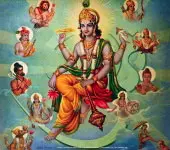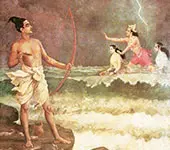Devotee's progress
Comments
Transcript
(Click here to read more)
We have already seen that interest to listen to the stories of Bhagavan comes as a result of good deeds that you have done over several births. The ultimate destination is the attainment of Bhagavan. Being one with Bhagavan. Merging into Bhagavan by losing your separate individual existence. This is called moksha. So today if you have interest in listening to Bhagavan's stories, then you are not a beginner, you are not a fresher. You may not know much about Bhagavan. But Bhagavata says, you are not a beginner. तच्छ्रद्द�....
Transcript
(Click here)
We have already seen that interest to listen to the stories of Bhagavan comes as a result of good deeds that you have done over several births.
The ultimate destination is the attainment of Bhagavan.
Being one with Bhagavan.
Merging into Bhagavan by losing your separate individual existence.
This is called moksha.
So today if you have interest in listening to Bhagavan's stories, then you are not a beginner, you are not a fresher.
You may not know much about Bhagavan.
But Bhagavata says, you are not a beginner.
तच्छ्रद्दधाना मुनयो ज्ञानवैराग्ययुक्तया।
पश्यन्त्यात्मनि चाऽऽत्मानं भक्त्या श्रुतिगृहीतया॥
The first stage is purifying the mind.
What are the impurities in the mind?
Unwanted desires, anger, greed, inability to distinguish between right and wrong, arrogance and tendency to compete.
All dharmik practices are meant to get rid of these impurities.
This is the first stage.
Once the impurities are reduced a desire to know the tattwa or the principles of Veda comes.
This is the second stage.
It doesn't necessarily mean that you join a Veda pathashala and start learning Vedas.
The quest about the supreme truth begins, you become a seeker.
This knowledge can come to you in any form, many forms.
This acquisition of knowledge, some knowledge, is the third stage.
In the next stage, the fourth you contemplate upon this knowledge.
You think about it, apply your mind to it.
This is called manana.
Through manana only you become convinced about the validity of this knowledge.
Our shastras don't say that just because a scholar said something or some scripture says so you accept it as it is.
No shastra says, you contemplate upon it and be convinced that it is correct.
Challenge it.
This is manana.
Once you are sure about the validity of the knowledge, then in the next stage, the fifth stage, which is called nididhyasana, you make that knowledge firm within yourself.
By constantly thinking about it.
Then you see that this knowledge is present everywhere, it is applied everywhere.
After this, in the sixth stage you develop vairagya, dispassion towards worldly objects and activities.
You neither like nor dislike anything.
Interest in listening to Bhagavan's stories comes after this.
In the seventh stage.
So today if you have interest to listen about Bhagavan you have already gone through six stages in your earlier births.
So you are not a beginner.
You are not a stranger.
You are not a newcomer.
You are not a late comer.
It is after this that bhakti takes over.
When you hear about Bhagavan's greatness, bhakti comes and bhakti leads you to the ultimate destination, ultimate goal of being one with Bhagavan.
Recommended for you
How the universe came out of Viratpurusha
 Click here to know more..
Click here to know more..
How to make remedies work for you

Find out what it takes to make spiritual remedies truly powerful and successful! Discover the crucial step that will ensure you get the best results p....
Click here to know more..Rama Pancharatnam

yo'traavateerya shakaleekri'ta- daityakeerti- ryo'yam cha bhoosuravaraarchita- ramyamoortih'. taddarshanotsukadhiyaam kri'tatri'ptipoortih' seetaapati....
Click here to know more..
English Topics
Bhagavatam
Click on any topic to open
- 65 Bhagavan's External Deeds
- 64 Is the Body Yours?
- 63 What's So Great About The Stories Of Sri Krishna
- 62 What To Do If You Just Don't Have Interest In Bhagawan
- 61 Which God Should I Worship?
- 60 How To Observe Dharma Properly
- 59 Devotee's progress
- 58 Which Guruji Can You Trust
- 57 Bhagawan Is Beyond Human Comprehension
- 56 The Missing Piece: Why Your Spiritual Practices Are Not Working
Please wait while the audio list loads..
30
Ganapathy
Shiva
Hanuman
Devi
Vishnu Sahasranama
Mahabharatam
Practical Wisdom
Yoga Vasishta
Vedas
Rituals
Rare Topics
Devi Mahatmyam
Glory of Venkatesha
Shani Mahatmya
Story of Sri Yantra
Rudram Explained
Atharva Sheersha
Sri Suktam
Kathopanishad
Ramayana
Mystique
Mantra Shastra
Bharat Matha
Bhagavatam
Astrology
Temples
Spiritual books
Purana Stories
Festivals
Sages and Saints
